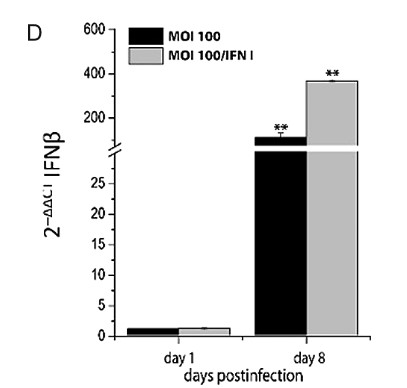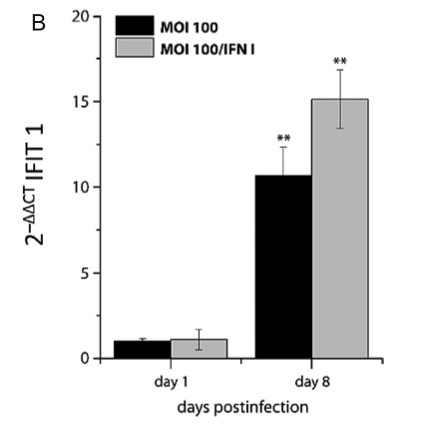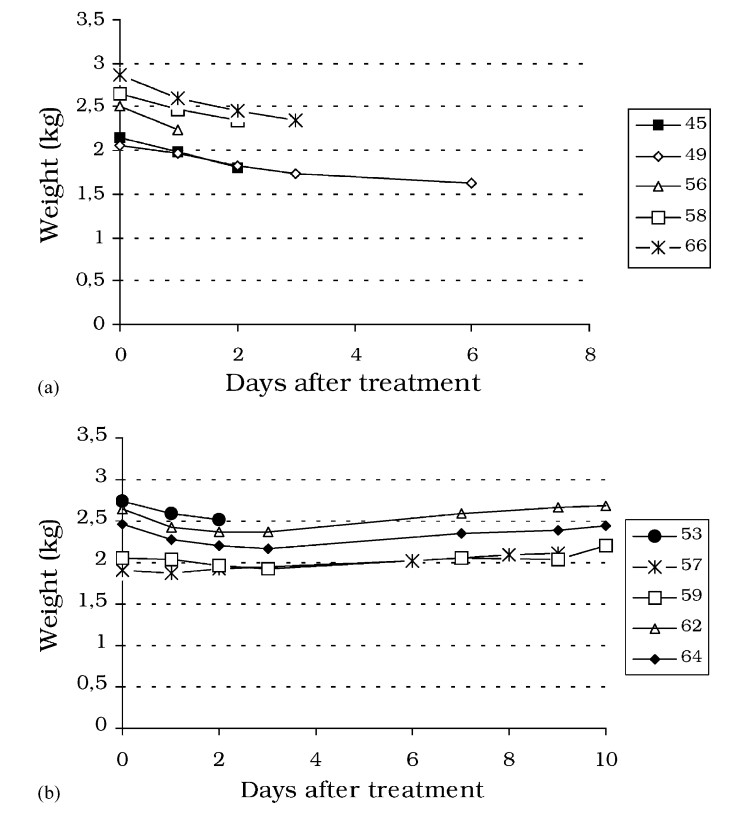Contents
- Role of Type I Interferon in Parvoviral Enteritis
- Clinical Study: Efficacy of Interferon-Omega Treatment in Dogs
- Laboratory Study: Evaluating the Impact of Interferon-Omega on Parvovirus
- Conclusion
- References
Role of Type I Interferon in Parvoviral Enteritis
Canine parvoviral enteritis is a viral disease that has spread worldwide. Symptoms of the infection appear 5-7 days after exposure and include hemorrhagic diarrhea, vomiting, loss of appetite, depression, severe dehydration, coma, and death. The canine parvovirus causes the disease. Currently, effective antiviral therapy is lacking.
Canine parvovirus suppresses the dog’s innate immunity by disrupting the synthesis of type I interferon (IFN-1). IFN-1 is the primary antiviral response of the body as it activates cellular defenses against infections. Insufficient production of type I interferon in parvoviral enteritis cannot halt the virus replication. Treatment with additional interferon omega (a subtype of IFN-1) stimulates the animal cells to produce their interferon, triggering the synthesis of antiviral proteins in sufficient quantities to suppress the infection.
Clinical Study: Efficacy of Interferon Omega Treatment in Dogs
French scientists explore the therapeutic potential of type I interferon for treating canine parvoviral enteritis in beagle puppies. Infectious enteritis in dogs, particularly in puppies, is a widespread, highly contagious, and often fatal disease. Puppies that have not yet been vaccinated, older dogs, and dogs under stress or weakened immune systems are most susceptible to the infection. Current supportive treatment methods for infectious enteritis in dogs only alleviate symptoms:
- Dehydration is addressed through intravenous fluid and electrolyte administration.
- Vomiting and pain associated with intestinal spasms are managed with symptomatic drug therapy.
- Prevention of secondary bacterial infection is achieved with antibiotics.
Vaccination is currently the most effective and recommended means of protecting puppies. Puppies receive their first protective antibodies while still in the womb if the mother has been vaccinated. After birth, the level of maternal antibodies in puppies rapidly declines, and puppies can be vaccinated starting at 6 weeks of age. During this period before the first vaccination, puppies are most vulnerable to parvovirus infection.
Study Design
The study was designed as a double-blind, placebo-controlled trial to assess the effectiveness of one of the subtypes of type I interferon – interferon-omega (IFN-ω) – for treating parvoviral enteritis. The experiment was conducted in two stages: infection, treatment, and animal health monitoring.
Fourteen beagle puppies were included in the study. All animals were infected with a virulent strain of canine parvovirus at a dosage of 0.2 ml/kg. Infection occurred via oro-nasal administration, introducing the virus into each nostril and throat. Infection developed in 10 puppies, randomly assigned to two groups: one group received treatment with interferon-omega, while the other received a placebo.
The treatment group received IFN-ω intravenously at a dose of 2.5 IU/kg daily for three days. Scientists used recombinant feline interferon-omega, as it is produced on an industrial scale and has already demonstrated efficacy in veterinary medicine for treating viral infections in various animal species. The control group received a placebo – a saline solution without the active substance. In addition to the primary treatment, all animals received supportive therapy, including an easily digestible diet and intravenous electrolyte solutions.
During the experiment, veterinarians closely monitored the development of clinical symptoms in the animals, including monitoring of appetite, presence of diarrhea and vomiting, overall physical condition, degree of dehydration, and changes in feces. Scientists regularly measured the body temperature and weight of the animals and conducted blood tests to assess hematological parameters.
Study Results
The most significant result of the study was a substantial reduction in mortality among puppies receiving interferon-omega. While all animals in the control group died, the survival rate in the IFN-ω group was 80%, which confirms the potential of interferon-omega as an effective treatment for canine parvoviral enteritis.
The experiment showed that clinical signs of the disease developed differently in both groups. In the group receiving interferon-omega, clinical signs became less pronounced as early as 3-4 days, and the overall condition of the animals improved. It was especially true for symptoms such as diarrhea, vomiting, and anorexia. Conversely, in the control group, animals continued to show worsening conditions, ultimately leading to their demise.
Additionally, during the study, it was noted that the body temperature and weight of puppies in the IFN-ω group remained more stable compared to the control group. Animals in the treatment group showed a trend towards gradual weight gain and temperature normalization by day 3, indicating an overall improvement in their health. The dynamics of weight change in animals are presented in the graphs below. Graph (a) – placebo group, graph (b) – treatment group.
Image source: https://www.sciencedirect.com/science/article/abs/pii/S0378113502001736
Blood tests showed a positive trend in hematological parameters in the IFN-ω group, including leukocyte count and erythrocyte levels, suggesting that treatment improved the immune response.
Scientists concluded that IFN-ω can significantly improve clinical signs and reduce mortality in dogs with parvoviral enteritis. However, further research is needed for a complete understanding of the mechanisms of action of IFN-ω and to determine the optimal dosing regimens and applications.
Laboratory Study: Evaluation of the Impact of Interferon-Omega on Parvovirus
Scientists from leading Mexican universities investigated the mutual influence of canine parvovirus and type I interferon. They quantitatively assessed the ability of canine parvovirus to evade the immune response and the effectiveness of treating parvoviral infection with IFN-omega. Like the clinical study, feline interferon omega was used in this experiment, as this interferon is produced on an industrial scale.
The first experiment showed that infection’s intensity depends on the viral particles’ concentration during infection. Moreover, the peak of viral particles occurs on the 8th day of infection regardless of their initial concentration.
In the following experiment, scientists compared the dynamics of infection development without treatment and with IFN-omega treatment. The concentration of viral particles in cells treated with IFN-omega practically did not change, while in untreated cells, it increased with intensity, as in the previous experiment.
Parvovirus suppresses the synthesis of antiviral proteins, while interferon treatment stimulates their production. Dog cells infected with parvovirus treated with feline IFN-omega produced approximately four times more of their interferon beta (a subtype of IFN-1) than untreated cells. Interestingly, the peak of synthesis of the antiviral protein IFIT1, which directly binds to the viral genome and blocks virus replication, occurred on the 8th day after infection. The dynamics of the synthesis of their own IFN-beta and the antiviral protein IFIT1 are presented in the graphs. Cells pre-treated with IFN-1 are marked in gray, while untreated cells are marked in black.
 |
 |
Image source: https://journals.pan.pl/dlibra/publication/138728/edition/120924/content
In the final experiment, scientists evaluated the speed of mechanisms initiating the synthesis of IFN-1 in healthy and infected cells. A statistically significant difference appeared only on the third day of infection development. However, the effectiveness of these mechanisms was insufficient to block parvovirus replication.
The laboratory study showed that canine parvovirus has effective mechanisms for suppressing the synthesis of IFN-1, but the virus cannot disrupt the functioning of existing interferon molecules.
The research was published in the Polish Journal of Veterinary Sciences. Details of the study are in the article “Canine Parvovirus Suppresses Innate Immunity.”
Conclusion
In a double-blind, placebo-controlled study, researchers evaluated the efficacy of interferon type I for treating parvoviral enteritis in Beagle puppies. The results demonstrated significant improvement in clinical symptoms and a notable reduction in mortality in the group receiving IFN-ω compared to the placebo group. Cat IFN-ω can be utilized as an effective treatment for parvoviral enteritis in dogs.
The canine parvovirus defends itself against the innate immune response by suppressing the production of sufficient amounts of type I interferon. Treatment with feline interferon omega stimulates the production of the dog’s interferon by its cells. As a result, infected cells produce enough antiviral proteins to cope with the infection and prevent virus replication.
Useful article, necessary information? Share it!
Someone will also find it useful and necessary:
References
- Treatment of canine parvoviral enteritis with interferon-omega in a placebo-controlled challenge trial
- Participation of interferon type I during canine parvovirus infection




